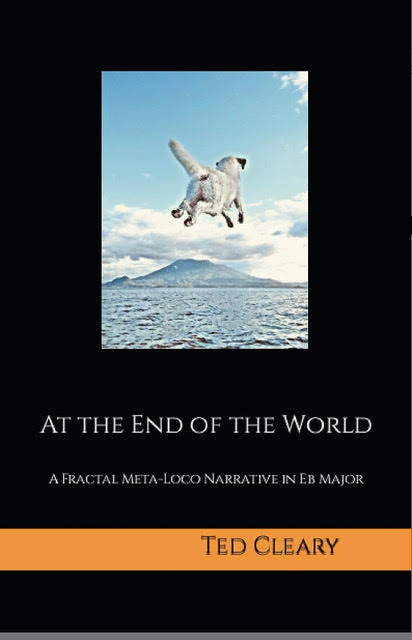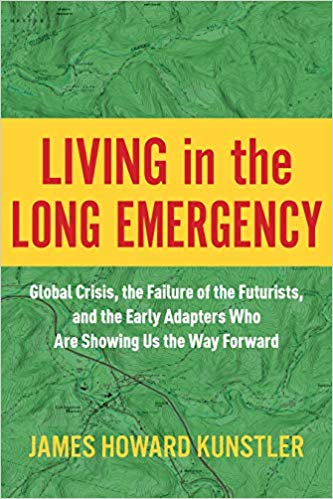This essay is a review of Dmitry Orlov’s excellent new book, The Five Stages of Collapse. I can’t recommend the book highly enough. Orlov is one of the great literary stylists of his generation as well as one of the leading intellectuals.
Link to Chris Martenson’s Peak Prosperity
A Review of Dmitry Orlov’s The Five Stages of Collapse
by JHK
For most people, the collapse of civilizations is a subject much more appetizingly viewed in the rear-view mirror than straight ahead down whatever path or roadway we are on. Jared Diamond wrote about the collapse of earlier civilizations to great acclaim and brisk sales, in a nimbus of unimpeachable respectability. The stories he told about bygone cultures gone to seed were, above all, dramatic. No reviewers or other intellectual auditors dissed him for suggesting that empires inevitably run aground on the shoals of resource depletion, population overshoot, changes in the weather, and the diminishing returns of complexity.
Yet these are exactly the same problems that industrial-technocratic societies face today, and those of us who venture to discuss them are consigned to a tin-foil-hat brigade, along with the UFO abductees and Bigfoot trackers. This is unfortunate but completely predictable, since the sunk costs in all the stuff of daily life (freeways, malls, tract houses) are so grotesquely huge that letting go of them is strictly unthinkable. We’re stuck with a very elaborate setup that has no future but we refuse to consider the consequences, so messengers are generally unwelcome.
Will the cost or availability of oil threaten America’s Happy Motoring utopia? There should be no question. But rather than prepare for a change in our daily doings, such as rebuilding the railroad system or promoting walkable neighborhoods over suburban sprawl, we tell ourselves fairy tales about how the Bakken shale oil play will make America “energy independent” to provide the illusion that we can keep driving to WalMart forever.
This is an especially delusional season in the USA, with salvos of disinformation being fired every day by happy-talkers seeking to reassure a nervous public that everything is okay. Just in the past few weeks we’ve seen an Atlantic Magazine cover story titled “We Will Never Run Out of Oil” followed by a report from the International Energy Agency stating that the USA would become the world’s number one oil producer by the year 2020, and many other bulletins of comforting optimism from The New York Times, NPR, and Forbes. The Atlantic Magazine used to be a credible organ of the American thinking classes, and the Paris-based IEA is vested with authority, though its political agenda (to prop up the status quo) is hidden. In any case, these are the interlocutors of reality for the public (and its leaders) and the memes they sow travel far, wide, and deep, whether they are truthful or not. The infectious conucopianism they gleefully retail has goosed the stock markets and made it even more difficult to put out the contrary view that we are in deep trouble, even on the verge of an epochal disruption.
Dmitry Orlov published a fascinating book on this subject in 2008 titled Reinventing Collapse: The Soviet Experience and American Prospects. Orlov, born in Leningrad (now St. Petersburg) in 1962, had the unusual experience of emigrating to the US as a twelve-year-old in the mid 1970s, and then returning periodically to what is now called Russia before, during, and after the collapse of its soviet system. He had a front-row seat for the spectacle and an avid intelligence rigorously trained in the hard sciences to evaluate what he saw. He also possessed a mordant, prankish sense of comedy that endowed his gloomy subject with a lot charm, so that reading him was the rare pleasure of encountering true prose artistry on a par with his countryman and fellow émigré, the late Vladimir Nabokov. Nabokov was a scientist, too, by the way, working for years as a professor of entomology (insects, with a specialty in butterflies) to pay the light bill.
Recall the smug triumphalism in America that greeted the shockingly sudden collapse of the sclerotic USSR in 1991 (no bang and little whimpering). Serious historians were so intoxicated that one of them declared it to be “The End of History,” meaning that there would be no more geopolitical struggles henceforth, a preposterous idea that became instant dogma from Harvard to the US State Department. To our pols and their wonks it proved the manifest superiority of neoliberal corporate capitalism. Case closed. Now the USA could go forth unopposed and turn the Black Sea into a lagoon of pure Coca Cola, bringing liberty, democracy, Chicken McNuggets, and Michael Jackson videos to the disadvantaged citizens of long-benighted lands yearning to “consume” freely.
From his special perch between the two nations, Orlov saw the whole show differently: as a warning that the USA would probably meet a similar fate, but that the outcome for us would probably be much worse due to our massive stranded assets (the whole kit of suburban sprawl), our degraded sense of public goods, our lost traditional craft skills, and our pathetic lack of mental fortitude. The arguments he presented were clear, sensible, and absent in virtually every other venue where people discussed the repercussions of the Soviet collapse. To me, Orlov’s points were startling in the slap-your-forehead sense of “…but of course! Why didn’t I think of that.”
For instance, he pointed out that the food production system in the Soviet Union had been so direly mismanaged for so long — most of the 20th century — that a whole counter system of work-arounds had been established in the form of nearly universal household gardening. Even families who lived in the ghastly Modernist apartment slabs of Moscow had access to garden plots in the vast un-suburbanized Russian countryside, and they could get there on public trains and buses. The more privileged had dachas ranging from humble shacks to fancy villas, each with its garden. The Russian people were used to the necessity of growing their own food and had the skills for preserving it to offset the idiocy of the official distribution system in which citizens wasted whole days waiting on line for a cabbage — only to be told they had run out. When the soviet system collapsed, the effect on society was far less than catastrophic, perhaps even salutary, because a large cohort of people with an interest in growing food, who formerly only pretended to work in dismal bureaucratic jobs, were now available to reoccupy and reactivate the de-collectivized farming sector that had been a drag on the Russian economy for generations. After a period of adjustment, one thing was self-evident: no more lines at the Russian grocery stores.
By contrast in the USA even farmers don’t have kitchen gardens. This is not a myth. I live in an agricultural backwater of upstate New York where dairy farming modeled on industrial agri-biz reigned for decades (it’s in steep decline now) and as a rule the farmers do not grow gardens. They buy balloon bread, Velveeta, and Little Debbie Snack Cakes at the supermarket, just like the insurance adjusters and other office drones, and whatever leftover part of their farm is not planted in corn is occupied by an above-ground pool, or the carcasses of retired all-terrain vehicles, or the miscellaneous plastic crap associated with raising children in a “consumer” culture. When even farmers don’t grow any of their own food, you can bet that a lot of knowledge has already been lost. American supermarkets operate on a three-day resupply cycle. The system is much more fragile than most Americans probably suppose. My guess is that few even think about it. The resupply system has never failed, except briefly, in localities hit by natural disasters. However, a financial crisis could cripple the food distribution system of the entire nation. Truckers who don’t get paid won’t deliver. Trouble in the Middle East oil nations could provoke an oil crisis — something we haven’t experienced since the 1970s. There are many ways for this complex system to fail — the point being that when it does, there will be no backup as was the case in the former Soviet Union. So one might conclude from reading Orlov that our prospects for being able to feed ourselves are a lot worse.
Housing: a similar story. There was no private real estate in the old USSR. People just occupied apartments and homes that belonged to the state and were assigned largely on the basis of privilege and connections to the people in power. When the political system collapsed, nobody got kicked out of their dwelling place. No foreclosures occurred. Over time, the situation took care of itself emergently, shall we say. Private ownership resumed after a 75-year hiatus. Laws regulating it were put in place. Many Russians ended up in possession of apartments and houses they had occupied for decades and a real estate market emerged from that (with some strong-arming from the potent Russian mafia).
Contrast that outcome with America’s experience beginning in 2007 with the imploding housing bubble: an extravaganza of foreclosure and even homelessness. And that episode must be considered a preview of coming attractions because the USA has not entered the robust phase of collapse yet. When that happens, you can expect the tribulations of property loss to be epic. It could throw our system of property law into chaos for a generation or more as the volume of foreclosures would become virtually unmanageable. Property law is at the core of our political system, which would then follow directly into an unmanageable condition. Orlov’s point, I think, is that a political collapse in the US would leave many more people discommoded than was the case in old soviet Russia.
Similarly, too, transportation. The Russians never adopted a culture of car dependency. A small minority of connected people had cars that they ostensibly “owned,” but the vast majority of the population depended on an elaborate public network of subways, trams, buses, and railroad trains. As a result they never constructed an alternative universe of suburban sprawl. When the soviet system imploded, the trains and buses, etc., kept on running. Russians could still get where they had to go to do what they had to do (rebuild their lives). We in America have poured our accumulated national wealth into a drive-in utopia that has no future in the remaining years of non-cheap oil. Any kind of an oil problem, whether it is a sharp geo-political event or just the slow crushing grind of high gasoline prices, will leave American stranded.
Part Two: A Clear Picture of What to Expect
Orlov’s Reinventing Collapse was a tour de force of political writing with true literary panache. It announced the arrival on the scene of a major thinker — in a period of history that didn’t care much about thinkers (unless they could invent cell phone apps). After that first book, he published some books of assorted essays, and now he is out with another major statement titled The Five Stages of Collapse — Survivors Toolkit (New Society Publishers). The new book assumes that global industrial civilization is on a collapse trajectory, and he doesn’t waste any ink on arguments trying to prove that. Rather, Orlov lays out in detail exactly how the process of civilizational collapse may actually happen. For many readers and observers, the prospect is often conceived in narratives of Hollywood-style apocalyptic melodrama with some kind of chaos driving the story. Orlov avoids that and instead presents a clear declension of proceedings that unfold naturally and comprehensibly in a certain order — like the progressive organ failure that doctors encounter in the intensive care unit. Orlov calls his method “a taxonomy of collapse.” The point of the book, he writes, is “(n)ot whether collapse will occur, but rather what it looks like, what to expect and how we should behave should we wish to survive.”
As he conceives it, the five stages would tend to play out in sequence based on the breaching of particular boundaries of consensual faith and trust that groups of human beings vest in the institutions and systems they depend on for daily life. These boundaries run from the least personal (e.g. trust in banks and governments) to the most personal (faith in your local community, neighbors, and kin). The first stage of collapse in Orlov’s framework, therefore, is financial collapse, because the operations of modern finance are so deeply dependent on trust between total strangers and faith in the abstract financial instruments (bonds, stocks, paper securities) that they traffic in, which themselves derive value largely from the sheer faith that they represent what they purport to represent. In the circus of swindles that finance has become, with pervasive accounting fraud and FASB “mark-to-fantasy” collateral lurking by the bale in the too-big-to-fail bank vaults, and serial re-hypothecation by shifty fiduciaries of other people’s assets, and MF Global-style looting of accounts, and LIBOR fixing, and the new Cyprus-style “bail-ins,” and untold other rackets rampant on the money scene, faith and trust have taken a terrible beating. One might even say they have been hopelessly trashed and it is now only a matter of time before the global counterparty banking system runs out of sheer inertial momentum and implodes. When that happens, say goodbye to accumulated wealth and access to capital — which is to say available investment in anybody’s future.
Financial collapse beats a quick path to Orlov’s second stage, commercial collapse where there isn’t enough money to conduct the logistical operations of daily life — moving the merchandise, doing business. “Faith that ‘the market will provide’ is lost,” Orlov writes. Commodities grow scarce and are hoarded. Supply chains break down. Trust between people and companies who do business with each other erodes. This is where truck drivers who don’t get paid, and can’t get any diesel fuel, stop delivering food to the supermarkets.
This phase of breakdown is where real human suffering begins. Unemployment shoots the moon. People go hungry. They can’t pay the electricity bill and the lights go off. They shiver in cold houses. Evictions and foreclosures leave people homeless. Things turn political and collapse of government commences, largely because government is too incompetent or feckless to rescue citizens from the disruptions of financial and commercial collapse. Faith and trust in elected leaders and official agencies are lost, indeed often in the whole political system itself. In depression-era Germany, the political outsider Adolf Hitler spoke freely of his contempt for Weimar democracy and the Nazi party came to power largely on the promise of “effective leadership” unencumbered by a pettifogging Reichstag — that is, dictatorship.
If political collapse does not resolve favorably, whether by heroic reform, or some sort of revolution, or the rise of an effective autocrat, things proceed to the next stage: social collapse. Orlov makes the interesting observation that the collapse of the Soviet Union terminated in political collapse and did not go further. Historians sitting around their campfires decades from now may marvel at Russia’s good fortune in that episode. Russia was able to reorganize effective government under V. Putin, and rebuild the financial and commercial sectors that the soviets had mismanaged so woefully. There was little revolutionary bloodshed, though through the 1990s the rule-of-law remained so flimsy that the Russian mafia filled the vacuum in enforcing property and contract issues, often with violence. Orlov provides an especially lively, detailed account of the Russian mafia’s workings as the default shadow law enforcement agency in that period to illustrate the consequences of political collapse.
For all the tribulations of the soviet collapse, Russia was still endowed with rich natural resources, oil and gas in particular, which allowed them to reorganize a high order advanced economy for a period of time that may prove to be rather brief. The next time, the outcome may not be so favorable. Russia’s oil production faces decline and the soviet collapse may have only been a dress rehearsal for the main event, so stay tuned on that.
When collapse comes to the USA, the firewall between political and social collapse my not hold due to the poor choices Americans made about organizing daily life back in the 20th century, especially the fiasco of suburbia and the extreme car dependency it entails. As Orlov conceives it, social collapse occurs up-close and personal when “faith that your people will take care of you is lost,” meaning that the fabric of even local community unravels. Disaster management, peacekeeping efforts, charity support of the weak, organized cooperation… all lose traction.
This is where you get the rule of gangs, failure of local law and order, vigilante justice, and the loss of any other institutional armature for civil relations. In the practical realm you get the lack of water service and sanitation and a scavenging economy (if you can call it that).
Under the best circumstances, and in theory, even given the gross discontinuities and deprivations of a post-oil world, societies might reorganize emergently (that is, respond successfully to new realities) and re-set to a decomplexified lower energy level. Civil institutions might be restored, but not necessarily in a way that we would recognize as modern or normal — for instance along lines that we would call neo-medieval, with the rule of “strong men,” much more clear-cut hierarchical class and gender relations, and other social bric-a-brac familiar from pre-modern history. This is the stuff of much futurist fiction. My own World Made By Hand novels depict such an outcome, minus zombies. (A few readers reacted with consternation that, for example, the feminist revolution had apparently come to an end in my scenario.)
Under the worst circumstances, a devastated society just can’t get its act back together and proceeds to the final stage: cultural collapse. This is something that has never been seen on the universal scale since the rise of civilizations (as far as I know) but has happened under the most extraordinary extremes, such as life during wartime, or in highly localized situations. Orlov references the subjects of ethnologist Colin Turnbull’s 1972 book, The Mountain People about an African tribe named the Ik of Uganda, who devolved to such a level of Hobbesian barbarism under the displacements of post-colonial Africa that even the supposedly hard-wired instincts of compassion, kindness, and love for children and spouses sputtered out. Human life in that mode would self-evidently seem to have a limited horizon. Eventually, the Ugandian government was importuned to disperse and resettle the tribe, with no more than ten individuals from it in any given place of resettlement. One would have to surmise that such a collapse on a universal scale would logically precede human extinction, since there is not an alternative planet to resettle de-culturated humanity on.
All of these issues, Dmitry Orlov addresses with outstanding clarity and a surprising wit. The Five Stages of Collapse is something apart from the many other books about the difficulties facing human beings at this moment in history. And given the rather grave subject, it is really a pleasure to read somebody who writes so well.





 JHK’s Three-Act Play
JHK’s Three-Act Play










Great post. I have been wanting to buy Orlav’s new book, now I know I must.
On another note, my husband drives a reefer for a living. Since I have believed that collapse is coming for a while now I feel it is not the best job to have. He might end up stuck on the other side of the country if things happened fast.
Meanwhile, my daughters and I prepare for the coming collapse by gardening and preparing our permaculture/sustainable lifestyle. My oldest daughter and a friend started a permaculture bookclub with Gaia’s Garden as the first book. We are planting a food forest in her back yard. We are also eating as much wild food as we can safely identify. My younger daughter is the family mechanic/scrounger/handyperson. I have been practicing herbal medicine for most of my adult life. Are we ready? Well, we are working on it.
Yes, business funding can be very hard to get, but not with Easy Fund Me! They offer great loans for small businesses and saved me from going under.
Excellent review. You’ve convinced me; I must have a [hardcopy] of mine very own!
I’m happy to learn that “you people” of keen wit insist on banging away at the ‘trust’ meme. No society worth its’ name can exist without it.
Order directly from Dmitry, so he can make a little jingle from this work. See his website for ordering info: http://cluborlov.blogspot.com/
It takes a great author to do justice to another great author’s work. Thanks, Jim, for taking this on, and doing such a fine job.
I also thoroughly enjoyed Dmitry’s new book, and I especially enjoyed his many case studies, of whick the Ik was one. These case studies are invaluable in illustrating Dmitry’s perception that the type of living we will all be doing post-collapse, as illustrated in varying degrees by the case studies, is considered unthinkable behavior, pre-collapse. Dmitry pulls no punches, ever, which is very refreshing and provides many instances of dark comedy, especially when he is interviewed. The shock on the face of the interviewer is completely audible.
Thanks again Jim for this article, and for your many other works of explanation, guidance and entertainment.
that our oil-addicted
monthly seo is so incredibly important to keep your rankings up and active.
Orlov is an excellent writer, no doubt, but to claim he is “on a par with” with Nabokov is absurd. Hyperbole in praise may be sincere but it still sounds like condescension. And Nabokov was never a professor of entomology, though he did work for many years at Harvard’s Museum of Comparative Zoology and spent at least part of his summers collecting butterflies for their collection.
Are you implying that Orlov is not as talented as Nabokov? Have you read Nabokov? How many works? His stylistics and observations are impeccable, but he is not a philosopher by any means and his social “visions” are not very innovative and quite limited, actually. Orlov, on the other hand, is an exceptionally independent and brilliant thinker and his “prose” is like champagne. I think that if anything, Orlov should take the lead over Nabokov, provided they were writing in the same mode.
I’m implying that i got my custom t shirts denver very quickly and they were great quality! Loved every minute of working with the owner.
a devastated society just
https://www.google.com/
Read the introduction to Dmitry Orlov’s book ‘5 stages of collapse’ for yourself, and have your eyes opened… http://newsociety.com/var/storage/blurbs/9780865717367_excerpt.pdf
Buy it from the publisher direct, not Amazon, to support the author: http://www.newsociety.com/Books/F/The-Five-Stages-of-Collapse
Have you checked out Annalee Newitz book Scatter, Adapt, and Remember: How Humans Will Survive a Mass Extinction? Interested in hearing how it stacks up against what Orlov has presented.
Ya know i’m always terrified of a mass extinction event lol I hope that never happens but if it does, oh well i guess!
bug exterminator
Excellent, excellent, excellent
However, I’m having trouble imagining that the collapse won’t be a take down event by the global elites in order for them to maintain some control of how and when society unravels.
I’ve been reading this book about pavers chandler
, it has so much information about installing pavers, types of paving materials, and cost!
Thank you for this post. Found it very informative.
https://www.statenislandcourtreporters.com
Love this info, thank you!
tempe pest control
You’re right this book is so great and I’m glad to see others enjoyed. It inspired me to do more reading today in niche I know little of, appliances. If you want,click here to check it out.